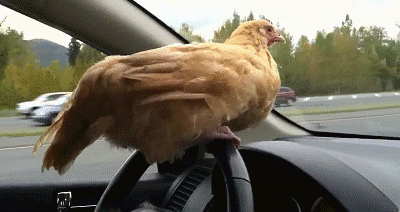I have recently gotten into birding. I’ve been watching them, counting them, and writing down all my observations in a small notebook for later reflection. I like watching them soar or eat at my birdfeeders. They are beautiful, intelligent creatures, but out of all the (roughly) 9,956 bird species in the world, my favourite is the humble chicken.
Gallus gallus domesticus. The domesticated descendant of the red junglefowl. The symbol of farmyards everywhere. Chickens are one of the most widespread domestic animals on earth. People keep them all over the world for their eggs, meat, and pest-managing abilities.
I feel moved to write today because I believe that the chickens of the world have gotten a bad rap. Around the farmyard, no one thinks that chickens are as intelligent as their mammal counterparts are. Everyone knows how smart pigs are, and research is coming out all the time, highlighting the emotional complexity and intelligence of cows, but let me tell you, chickens deserve a little more respect.
Personalities
To start, chickens have distinct personalities. Their personalities often correlate to their social standing in the pecking order—an order that names itself with utmost accuracy. Chickens peck each other in a certain order. Chickens at the top get to peck all other chickens. Chickens in the middle can’t peck chickens above them, but can peck chickens below them. Chickens at the bottom get to peck no one.
Shyer, more ‘fraidy-cat’ type chickens often fall lower in the order, while bolder chickens generally stay at the top. Their social lives do not end there; chickens who are stressed recover more quickly when surrounded with other chickens they know than chickens they don’t know. Just like us, they want their friends to be around to support them during the good and the bad.
Communication
Chickens also have a complex communication system. They convey information with a range of 20 to 30 different vocalizations. The clucks, whistles and calls can let other chickens know that danger is afoot, that delicious food is near, or a personal favourite of our chickens here at Science World, they may give off a loud, repetitive cry to announce they’ve laid an egg (and they’re very proud of it). This type of self-awareness is a trait also found in highly intelligent species, such as the primates.
Spatial Awareness
Perhaps one of the most amazing skills chickens possess is their ability to understand that an object exists, even if they cannot see the object. Newly hatched chicks were presented with two piles of food in different quantities. When these piles were hidden behind a screen, the chicks were able to successfully locate the larger pile. This not only means that chickens can do simple math, but that they have a sharp perception of their surroundings. (To compare, it takes human babies six months to develop this skill.)

There’s no limit to what we can do!
Find out more about the inner workings of chicken brains! Learn how we know that Chickens can do math. Want to observe chicken behaviors to decide for yourself? Come visit our Science Park, opening March 11, 2017.